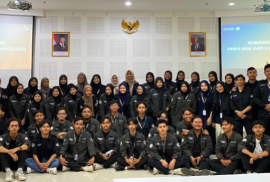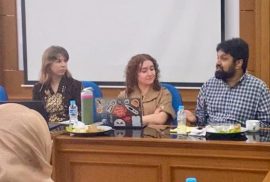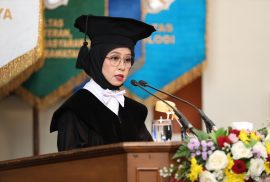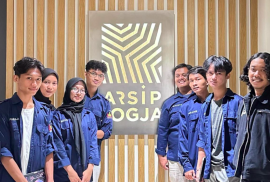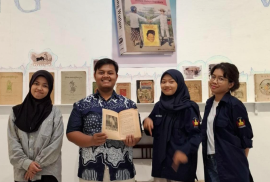Yogyakarta, April 26, 2025 – The Student Association of Arabic Study Program (IKMASA) of Universitas Gadjah Mada (UGM) welcomed a delegation from the Student Association of Arabic Language and Literature (HMPS BSA) of Universitas Ahmad Dahlan (UAD) in a collaborative visitation program titled IKMASA Berkunjung (SANJUNG). This visit was part of HMPS BSA UAD’s initiative to strengthen organizational quality, evaluate performance, expand networks, and foster innovation among students of Arabic Literature.
The event brought together the executive members of IKMASA 2025/2026 and HMPS BSA UAD 2024/2025, including both chairpersons—Candra Solihin (IKMASA UGM) and Galih Yoga (HMPS BSA UAD). The program featured a warm silaturahmi (bond-building session) between the two organizations, including cabinet presentations by both chairpersons, division-level sharing sessions, and a campus tour followed by a group photo session.
Held at the Faculty of Cultural Sciences UGM, specifically in Room 709 of Soegondo Building, the event began at 09.00 AM with an Opening Ceremony. The agenda included a Qur’anic recitation and a communal singing of the Indonesian national anthem, “Indonesia Raya.” Welcoming speeches from representatives of both organizations followed, expressing shared hopes and the purpose behind this inter-campus initiative.
In the main session, each chairperson presented their respective organizational structures and work programs, aiming to inspire mutual collaboration and exchange of ideas. From 10.30 to 11.00 AM, the program continued with a dynamic interdepartmental sharing session that provided a valuable forum for discussion, reflection, and the exchange of experiences and strategies.
The visit concluded with a campus tour of UGM, giving guests from HMPS BSA UAD a closer look at the university environment while strengthening the personal and institutional connections between the two groups.
It is hoped that this event will serve as the foundation for future collaboration and continued communication between IKMASA UGM and HMPS BSA UAD. Beyond building organizational insight, the program also fostered meaningful relationships and a spirit of unity among Arabic Literature students from different institutions.
SANJUNG marks a positive step forward in promoting inter-university dialogue and collaboration. Activities like this demonstrate that the spirit of student organization and cooperation can flourish not only within UGM and UAD but also across other Arabic Literature programs throughout Indonesia—encouraging a more connected and empowered academic community.
[External Relations Division of IKMASA]

